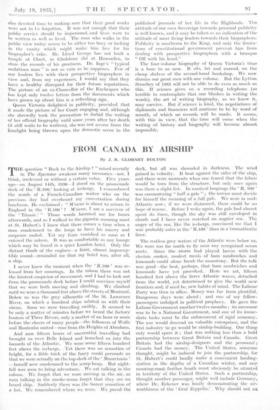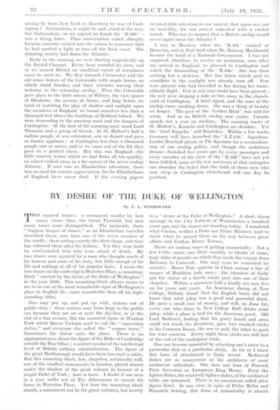FROM CANADA BY AIRSHIP
By J. R. GLORNEY BOLTON THE question "Back to the Airship ? "raised recently' in The spectator awaken many memories—not, I think, irrelevant or without a certain value. Five years• ago—on August 14th, 1930—I stood on the promenade deck of the '11.100,' looking at icebergs. I remembered the words of a French-Canadian waiter who on the previous day had Overheard my conversation during luncheon. He exclaimed ". M'sieur is about to return to England in the 11.100' ? M'sieur, I am a survivor of the Titanic.' ". Those words haunted me for hours afterwards, and as I walked to the gigantic mooring mast at St. Hubert's I knew that there comes a time when a man condemned to die longs to have his misery and suspense ended. Yet my fears vanished as soon as I entered the saloon. It was as comfortable as any lounge which may be found in a quiet London hotel. Only the distant throb of the engines—a faint, almost impercep- tible sound—reminded me that my hotel was, after all, ti ship.
• I never knew the moment when the 11.100 ' was re- leased from her moorings. In the saloon there was not the faintest suspicion of movement; and I had to look out from the promenade deck before I could convince myself that we were both moving and climbing. We climbed until-we were a thousand feet above the streets of Montreal. Below us was the grey silhouette of the St. Lawrence River, on which a hundred ships saluted us with their sirens. Soon' we were travelling swiftly. It seemed to be only a matter of minutes before we heard the factory hooters of Three Rivers, only a matter of an hour or more before the cheers of many people—the followers of Wolfe and Montcalm united—rose from the Heights of Abraham. . And now fifteen hours of : uneventful travelling had brought us over Belle island and launched us into the hazards .ctf the. Atlantic.. We were some fifteen hundred feet above the ;icebergs. , Yet there was no sensation of height, for a. little .trick of the fancy could, persuade us that we were actually onthetop-deck of the:' Mauretania t-7.--herself now condemned to the scrap-heap, But night- fall was soon to. bring adventure. We sat talking, in the saloon. We . forgot that, we were moving in. the air, . as men; talking in the smoke-room- forget that they are, on board ship. Suddenly there was the barest sensation of a list.; We remembered where we wore. We paced the deck, but all Was shrouded 'in darkness. The wind gained in velocity. It beat against the sides of the ship, and -there were moments when one feared that the fabric would be torn from the structure, but only once again was there a slight list. In nautical language the R. 100' was encountering "half a gale " ; the novice must decide for himself the meaning of a full gale. We were in mid Atlanticnow ; if we were distressed, there could be no hope of rescue. Before I woke again, the gale had almost spent its. force,. though the sky was still enveloped in clouds and I have never watched an angrier sea., The anger of the sea, like the icebergs, convinced me that I was probably safer in the 11.100 ' than in a transatlantic' liner.
The restless grey waters of the Atlantic were below us.: We were too far north to fly over any. recognized ocean route.. Since the. storm had played havoc with' the electric cooker, modest meals of ham -sandwiches and lemonade could alone break the monotony. But the talk was good—the best, perhaps, that ham sandwiches and lemonade have yet provoked., Here we sat, fifteen hundred feet above the fierce Atlantic waves, detached from the •world, yet determined to give the world new. frontiers and, if need be, new habits of mind. The Labour Party was then in office.. Money was far from plentiful.- Dangerous days were ahead ; and one .of my fellow- passengers indulged in political prophecy. He gave the Labour Government another twelve months ; its successor was to be a National Government, and one of its imme- diate tasks must be the enforcement of rigid economy. The axe would descend on 'valuable enterprises, and the first industry to -go would be airship-building. One thing only would spare it;' that was nothing less than a bold partnership between Great Britain and Canada. Great Britain: had the airship-designers and the personnel ;, Canada had the money. ,.The United States, someone thought, might be, induced to join the partnership, for St. Hubert's could hardly make a convenient, landing- station in the depths of a Canadian winter, and., any Mooring7rnask- further South must obviously be situated in territory of the. United States. ; Such a partnership, thought another passenger, might well include Germany, where Dr,.. Kckener was, busily, demonstrating the air- worthiness, of the ,Graf Zeppelin,' Why should not au. airship fly from New York to Hamburg by way of Card- ington? Nationalism, it might be said, stood in the way, but Nationalism—so we argued on board the '11.100 '- was a dying force. Then conversation ended abruptly because someone rushed into the saloon to announce that he had spotted a light or two off the Irish coast. The debating society had flown the Atlantic.
Early in the morning we were floating majestically up the Bristol Channel. Every boat soUnded its siren, and etS we neared Bristol an unofficial escort of *aeroplanes Came to meet us. We flew towards Cirencester and the old stone houses of the Cotswolds with ample lawns, on Which stood families and their servants waving their Welcome to the returning airship. Then the Cotswolds gave place to the little streets of Witney, the vast space§ of Blenheim, the avenue at Stowe, and long before we tired of watching the play of shadow and sunlight upon the meadows of England, we found ourselves less than a thousand feet above the buildings of Bedford School. We were descending to the mooring mast and the hangars of Cardington. At the foot of the mooring-mast stood Lord Thomson and a group of friends. At. St. Hubert's half a Million people, it was estimated, saw us depart and gave us frantic applause ; at Cardington less than a thousand people saw us arrive, and as we came out of the lift they gave us a genteel cheer. But this was England—the little country across which we had flown all too quickly, an island tucked away in a far corner of the never-ending Atlantic. If ours was an Elizabethan adventure, there was no need for ecstatic appreciation, for the Elizabethans of England have never died. If the evening papers devoted little attention to our arrival, that again was not an incivility, for our arrival coincided with 'a cricket match. Who was to suspect that a British airship would never again cross the Atlantic ?
I was in Bombay when the '11.101' crashed at Beauvais, and in Port Said when Mr. Ramsay MacDonald became the head of a National Government. I was not surprised, therefore, to receive an invitation, soon after my arrival in England, to proceed to Cardington and watch the dismantling of the R.100.' She was then nothing but a skeleton. Her fine fabric which used to scintillate in the sunlight was already torn off. Few were present who had travelled in her during her trans- atlantic flight. Few in any case could have been present : the rest were sleeping a mile or two away in the church- yard of Cardington. A brief signal, and the nose of the airship came crashing down. She was a thing of beauty no longer. The peer of the 'Golden Hind' was sold for scrap. And so no British airship now exists. Canada spends not a cent on airships. The mooring masts of St. Hubert's, Karachi and Cardington are desolate. Yet the Graf Zeppelin ' still flourishes. Within a few weeks Germany will have launched the L.Z.129.' Squadron- Leader Burchall pleads in The Spectator for a reconsidera- tion of our airship policy, and though the ambitious dreams cherished five years ago by every passenger and every member of the crew of the '11.100' have not yet been fulfilled, none of the few survivors of that enterprise can abandon the belief that the faith of those men who now sleep in Cardington churchyard will one day be justified.



























































 Previous page
Previous page